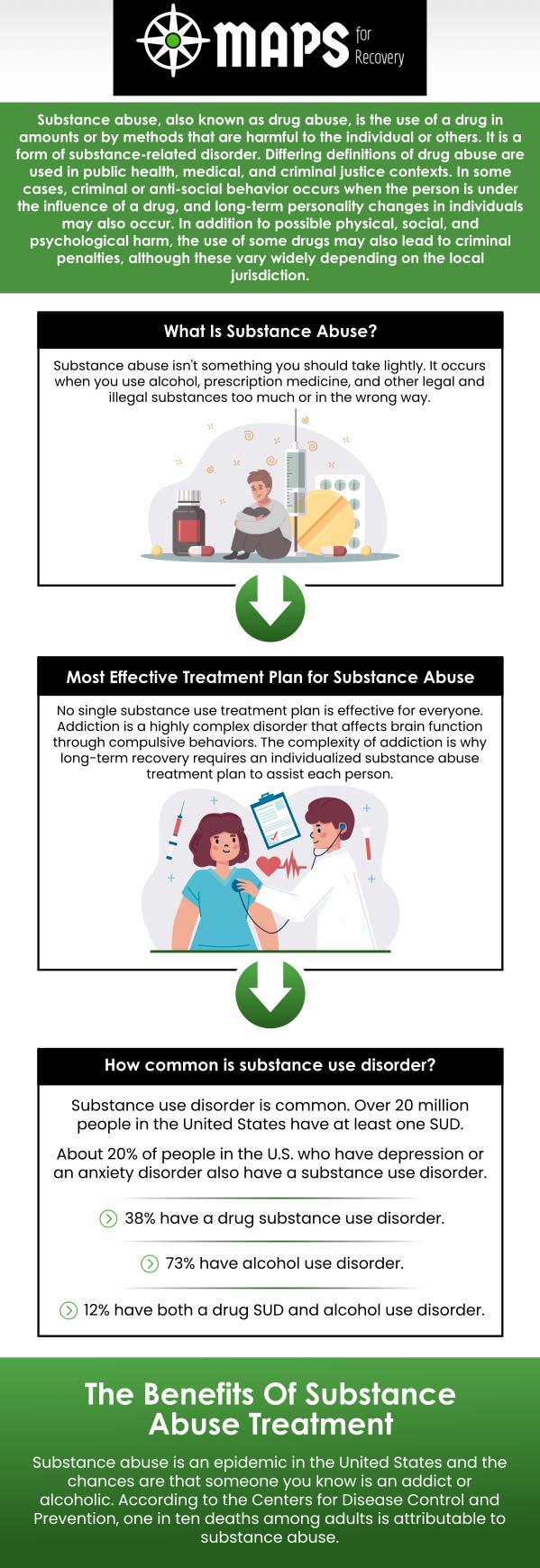Drug Abuse & Addiction: Effects on Brain, and Risk Factors
Drug abuse is increasingly recognized as a brain disease due to the significant functional changes it induces in the brain’s circuits, affecting behavior, self-control, and responses to stress and rewards. Treating addiction as a serious health issue is paramount, and recovery often involves a combination of therapy, medication, and behavior modification to address and restructure thought patterns and behaviors influenced by addiction. If you or any of your loved ones are suffering from addiction, come to MAPS for Recovery. For more information, contact us or book an appointment online. We are conveniently located at 13809 Research Blvd Stu 500, Austin, TX 78750.




Table of Contents:
What are the risk factors for drug addiction?
Is drug abuse a brain disease?
How do drugs affect the developing brain?
Which part of the brain is responsible for addiction?
How can Lynn E. Lytton, MD, help in understanding the effects of drug abuse and addiction on the brain and risk factors?
Drug addiction is a multifaceted issue with various risk factors contributing to its development. While anyone can become addicted to drugs, certain individuals may be more susceptible due to specific factors.
Prolonged drug use can lead to tolerance, requiring higher doses to achieve the same effects, and ultimately result in dependency and addiction. Behaviors harmful to one’s daily life, such as persistent drug-seeking actions, can manifest, disrupting work, school, and relationships.
Individuals with a family history of substance use or underlying mental health conditions are particularly at risk. The relationship between mental health and drug addiction is cyclical; mental health issues can lead to drug misuse, and drug addiction can exacerbate or lead to mental health problems. Recognizing the risk factors is crucial for prevention and early intervention. Understanding the dynamics of drug addiction is essential in offering support and finding the appropriate treatment.
Providers at MAPS for Recovery offer personalized care to address the unique needs of each individual. By focusing on the underlying causes and providing comprehensive treatment plans, they aim to assist patients in overcoming addiction and improving their overall well-being.
Drug abuse is increasingly recognized as a brain disease due to the significant functional changes it induces in the brain’s circuits, affecting behavior, self-control, and responses to stress and rewards. These changes can manifest during drug use and may persist long after the drug use.
Like any disease, drug addiction disrupts bodily functions and, without treatment, can have severe and long-lasting effects. Treating addiction as a serious health issue is paramount, and recovery often involves a combination of therapy, medication, and behavior modification to address and restructure thought patterns and behaviors influenced by addiction.
The specialists at MAPS for Recovery understand the neurological basis of addiction and tailor their treatment approaches accordingly. Recognizing that abstinence-based treatments alone may not suffice; they focus on comprehensive plans that address the multifaceted nature of addiction.
By treating the brain as the central battleground of addiction, they offer therapies aimed at rewiring thought patterns and behaviors, providing a path to recovery and a return to a fulfilling life.
The impact of drugs on the developing brain is multifaceted, and particularly concerning for young individuals. During the formative years, the brain is especially vulnerable to the detrimental effects of drugs, which can disrupt key neurotransmitters and brain structures like the prefrontal cortex.
This disruption can impair cognitive functions, lower IQ, and impede memory and the ability to perform routine tasks. Early drug use is not only indicative of potential future substance misuse but also increases the risk of developing addiction later in life.
Recognizing the signs of potential addiction in young people, such as fatigue, social withdrawal, and declining performance at school or work, is critical for early intervention. Parents and guardians must maintain an open dialogue about drug use and its consequences with young people. At the first signs of potential addiction, it’s crucial to seek professional help.
Addiction primarily affects the brain’s reward circuit, known as the mesolimbic dopamine pathway. This system, responsible for eliciting pleasurable feelings in response to enjoyable activities, is significantly disrupted by drug addiction. Drugs can alter this reward system, causing changes in the brain that make drug-induced dopamine release the primary source of pleasure, leading to dependency. Besides the mesolimbic pathway, addiction can manifest in other brain regions, including the prefrontal cortex, the extended amygdala, and the basal ganglia, among others. These areas play roles in decision-making, stress response, and habitual behaviors, all of which are critical in the development and perpetuation of addiction.
Lynn E. Lytton, MD, at MAPS for Recovery in Austin, TX, specializes in helping individuals understand how drug abuse and addiction impact the brain and contribute to long-term health issues. Drug abuse affects the brain by altering its chemistry and structure, particularly the areas responsible for pleasure, decision-making, and self-control. Over time, these changes can make it increasingly difficult for individuals to stop using substances, even when they know the negative consequences.
Addiction not only affects brain function but also influences behavior, leading to compulsive substance use. This can result in a range of problems, from health complications to relationship breakdowns and difficulties at work or school. Additionally, drug addiction is influenced by various risk factors such as genetics, environment, mental health conditions, and early exposure to substances.
At MAPS for Recovery, Dr. Lytton provides comprehensive treatment plans that address the brain’s role in addiction. Through medically supervised detox, therapy, and counseling, the clinic helps patients understand the neurological effects of addiction and develop strategies to regain control. Drug addiction treatment is available at MAPS for Recovery. For more information, contact us. We serve patients from Austin TX, Georgetown TX, Leander TX, Jonestown TX, Cedar Park TX, Round Rock TX, Rollingwood, TX, Bluff Springs TX, Del Valle TX, and surrounding areas.
Check Out Our 5 Star Reviews


ADDITIONAL SERVICES YOU MAY NEED
- Addiction Treatment
- Alcohol Dependence Treatment
- Benzodiazepine Treatment
- Chronic Pain Treatment
- Drug Treatment
- EMDR Therapy
- Heroin Addiction Treatment
- Medical Management of Alcohol Addiction
- Medical Management of Benzodiazepine
- Medical Management of Opiate Addiction
- Opioid Dependence Treatment
- Tobacco Cessation Treatment
- Transitioning off Xanax

ADDITIONAL SERVICES YOU MAY NEED
- Addiction Treatment
- Alcohol Dependence Treatment
- Benzodiazepine Treatment
- Chronic Pain Treatment
- Drug Treatment
- EMDR Therapy
- Heroin Addiction Treatment
- Medical Management of Alcohol Addiction
- Medical Management of Benzodiazepine
- Medical Management of Opiate Addiction
- Opioid Dependence Treatment
- Tobacco Cessation Treatment
- Transitioning off Xanax




